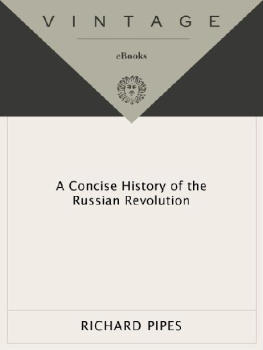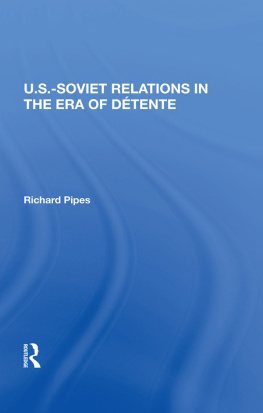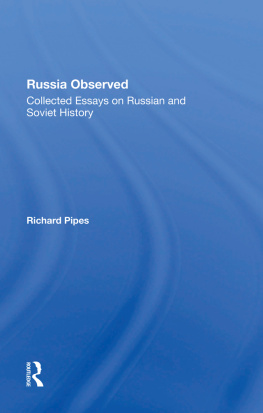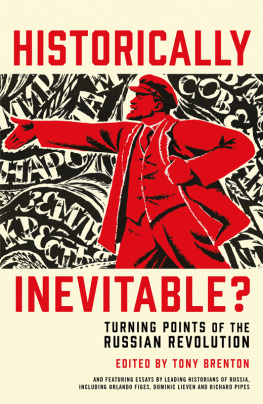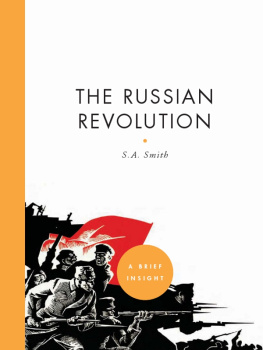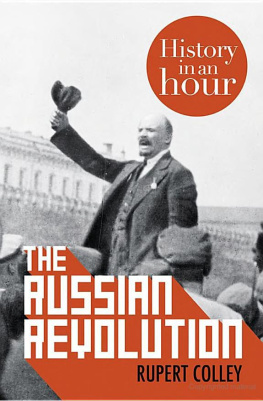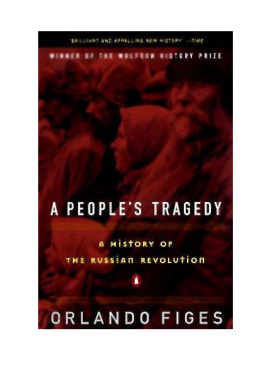Richard Pipes - A Concise History of the Russian Revolution
Here you can read online Richard Pipes - A Concise History of the Russian Revolution full text of the book (entire story) in english for free. Download pdf and epub, get meaning, cover and reviews about this ebook. year: 2011, publisher: Knopf Doubleday Publishing Group, genre: Politics. Description of the work, (preface) as well as reviews are available. Best literature library LitArk.com created for fans of good reading and offers a wide selection of genres:
Romance novel
Science fiction
Adventure
Detective
Science
History
Home and family
Prose
Art
Politics
Computer
Non-fiction
Religion
Business
Children
Humor
Choose a favorite category and find really read worthwhile books. Enjoy immersion in the world of imagination, feel the emotions of the characters or learn something new for yourself, make an fascinating discovery.
- Book:A Concise History of the Russian Revolution
- Author:
- Publisher:Knopf Doubleday Publishing Group
- Genre:
- Year:2011
- Rating:5 / 5
- Favourites:Add to favourites
- Your mark:
- 100
- 1
- 2
- 3
- 4
- 5
A Concise History of the Russian Revolution: summary, description and annotation
We offer to read an annotation, description, summary or preface (depends on what the author of the book "A Concise History of the Russian Revolution" wrote himself). If you haven't found the necessary information about the book — write in the comments, we will try to find it.
A Concise History of the Russian Revolution — read online for free the complete book (whole text) full work
Below is the text of the book, divided by pages. System saving the place of the last page read, allows you to conveniently read the book "A Concise History of the Russian Revolution" online for free, without having to search again every time where you left off. Put a bookmark, and you can go to the page where you finished reading at any time.
Font size:
Interval:
Bookmark:

RICHARD PIPES
A Concise History of
the Russian Revolution
Richard Pipes, Baird Professor of History at Harvard University, is the author of numerous books and essays on Russia, past and present. His most recent book is Russia under the Bolshevik Regime (1994). In 198182 he served as President Reagans National Security Council adviser on Soviet and East European affairs, and he has twice received a Guggenheim fellowship. He lives in Cambridge, Massachusetts.
ALSO BY RICHARD PIPES
The Formation of the Soviet Union: Communism
and Nationalism 191723 (1964)
Struve: Liberal on the Left, 18701905 (1970)
Russia under the Old Regime (1974)
Struve: Liberal on the Right, 19051944 (1980)
Survival Is Not Enough (1984)
Russia Observed (1989)
The Russian Revolution (1990)
Communism: The Vanished Specter (1994)
Russia under the Bolshevik Regime (1994)

Lenin, March 1919.

FIRST VINTAGE BOOKS EDITION, DECEMBER 1996
Copyright 1995 by Richard Pipes
Maps copyright 1990, 1995 by Bernhard H. Wagner
All rights reserved under International and Pan-American Copyright Conventions. Published in the United States by Vintage Books, a division of Random House, Inc., New York, and simultaneously in Canada by Random House of Canada Limited, Toronto. Originally published in hardcover by Alfred A. Knopf, Inc., New York, in 1995.
This work is a condensation of two volumes published originally by Alfred A. Knopf, Inc., as: The Russian Revolution, copyright 1990 by Richard Pipes, and Russia under the Bolshevik Regime, copyright 1994 by Richard Pipes
The Library of Congress has cataloged the Knopf edition as follows:
Pipes, Richard.
A concise history of the Russian Revolution / Richard Pipes.
1st ed.
p. cm.
Abridged version of The Russian Revolution and of Russia under the Bolshevik Regime.
eISBN: 978-0-307-78858-0
1. Soviet UnionHistoryRevolution, 19171921.
2. RussiaHistoryNicholas II, 18941917. I. Pipes,
Richard. Russian Revolution. II. Title.
DK265.P4742 1995
947.084Idc20 953127
Random House Web address: http://www.randomhouse.com/
v3.1
To Mark, Sarah, and Anna
Lenin, March 1919. VAAP, Moscow.
Russian peasants, late nineteenth century. The Library of Congress.
Village assembly. Courtesy of the Board of Trustees of the Victoria and Albert Museum, London.
Strip-farming as practiced in central Russia, c. 1900.
Nicholas II and family shortly before World War I. Brown Brothers.
Sergei Witte. The Library of Congress.
P. A. Stolypin: 1909. M. P. Bok Papers, Bakhmeteff Archive, Rare Book and Manuscript Library, Columbia University.
Nicholas II at army headquarters, September 1914.
Rasputin with children in his Siberian village.
Alexander Protopopov.
Crowds in Znamenskii Square, Petrograd. The Library of Congress.
Petrograd crowds burning emblems of the Imperial regime, February 1917. The Illustrated London News.
Provisional Committee of the Duma. The Library of Congress.
Executive Committee (Ispolkom) of the Petrograd Soviet. Slavic and Baltic Division, the New York Public Library, Astor, Lenox, and Tilden foundations.
Paul Miliukov. The Library of Congress.
Alexander Kerensky.
N. D. Sokolov drafting Order No. 1, March 1, 1917.
A sailor removing an officers epaulettes. VAAP, Moscow.
Grand Duke Michael.
Ex-Tsar Nicholas at Tsarskoe Selo, March 1917. The Library of Congress.
Lenin, Paris, 1910.
Kerensky visiting the front, summer 1917. Courtesy Bakhmeteff Archive, Rare Book and Manuscript Library, Columbia University.
Russian soldiers fleeing Germans, July 1917. The Daily Mirror (London).
The events of July 1917.
Leon Trotsky.
General Lavr Kornilov.
Grigorii Zinoviev. Slavic and Baltic Division, the New York Public Library, Astor, Lenox, and Tilden foundations.
L. B. Kamenev. Courtesy of the Trustees of the Imperial War Museum, London.
Cadets (iunkers) defending the Winter Palace, October 1917.
One of the early meetings of the Council of Peoples Commissars. VAAP, Moscow.
The signing of the armistice at Brest, 1917.
Russian and German troops fraternizing, winter 191718. Culver Pictures.
Maria Spiridonova. Isaac N. Steinberg Collection, YIVO Institute for Jewish Research, New York.
Ipatevs housethe House of Special Designation.
The murderer of Nicholas II, Iurovskii, with his family.
Isaac Steinberg. Slavic and Baltic Division, the New York Public Library, Astor, Lenox, and Tilden foundations.
Feliks Dzerzhinskii.
Fannie Kaplan. David King Collection, London.
Dzerzhinskii and Stalin.
General Alekseev.
Kornilov with young volunteers.
General Denikin.
Stalin in Tsaritsyn, 1918. Courtesy of the Central Museum
Admiral Kolchak.
Trotsky and Commander in Chief S. S. Kamenev. Boris S. Sokolov Collection, Hoover Institution Archives.
Tukhachevskii. Alexander Meledin, Moscow.
Budnnyi and Egorov. Alexander Meledin, Moscow.
General Wrangel. The Library of Congress.
Radek on the eve of World War I.
The capitalist pig squirming. Poster Collection, Hoover Institution Archives.
Lenin and Central Committee Secretary, E. D. Stasova. Alexander Meledin, Moscow.
John Reed and Louise Bryant. Reed Collection, Houghton Library, Harvard University.
Lunacharskii.
Street theater. David King Collection, London.
Scene from Tretiakovs Do You Hear, Moscow?
Workers toppling the statue of Alexander III in Moscow.
Agitational streetcar. Alexander Meledin, Moscow.
Besprizornye. David King Collection, London.
Nadezhda Krupskaia. Alexander Meledin, Moscow.
Alexandra Kollontai.
Patriarch Tikhon.
Soldiers removing valuables from Simonov Monastery in Moscow, 1925. David King Collection, Moscow.
The antireligious play Heder. YIVO Institute for Jewish Research, New York.
A food detachment. Alexander Meledin, Moscow.
Alexander Antonov. Courtesy of the Central Museum of the Revolution, Moscow.
A typical street scene under War Communism. Boris S. Sokolov Collection, Hoover Institution Archives.
Help! by Moor. Poster Collection, Hoover Institution Archives.
A common sight on the streets of Moscow and Petrograd, 191821. Boris S. Sokolov Collection, Hoover Institution Archives.
Red Army troops assaulting Kronshtadt. Alexander Meledin, Moscow.
An open market under the NEP. Alexander Meledin, Moscow.
One victim of the 1921 famine.
Corpses of starved children. The Library of Congress.
American Relief workers feeding Russian children during the 192122 famine. Courtesy Hoover Institution Archives.
The troika.
Lenin at Gorki, 1923. RTsKhIDNI Moscow.
Stalin viewing Lenins body. David King Collection, London.
The word revolution has an interesting etymology. When asked by Soviet sociologists what it meant to them, Russian peasants responded
Font size:
Interval:
Bookmark:
Similar books «A Concise History of the Russian Revolution»
Look at similar books to A Concise History of the Russian Revolution. We have selected literature similar in name and meaning in the hope of providing readers with more options to find new, interesting, not yet read works.
Discussion, reviews of the book A Concise History of the Russian Revolution and just readers' own opinions. Leave your comments, write what you think about the work, its meaning or the main characters. Specify what exactly you liked and what you didn't like, and why you think so.

